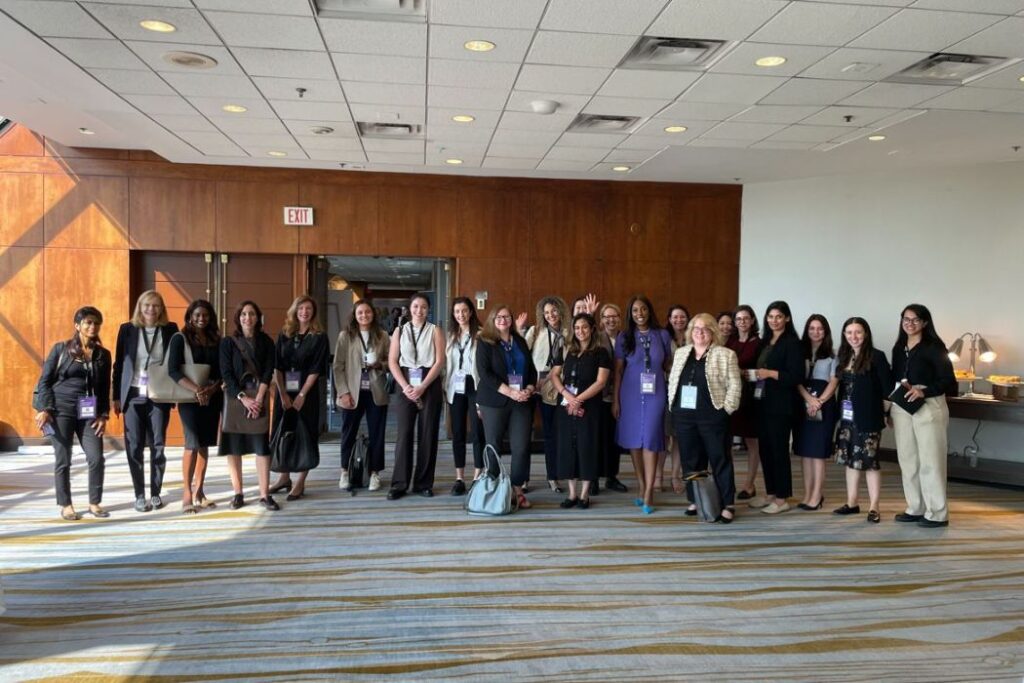In recent years, many fund limited partners (LPs) have put pressure on the traditionally white and male-dominated Canadian venture capital (VC) industry to hire more diverse candidates, and research indicates that this work has been paying off.
But according to Roxanne Leduc, a Canadian Women in VC (CWVC) board member and founder and CEO of diversity, equity, and inclusion (DEI) consultancy Cap Inclusive, LPs and the VCs they back have focused less of their efforts on inclusion—and this is likely why some Canadian funds are struggling to retain the women and visible minorities they hire.
“When markets are tough, unfortunately, if it’s not mandatory, it will not be a priority for any fund.”
Roxanne Leduc, Canadian Women in VC and Cap Inclusive
Amid challenging VC market conditions, creating an environment where all folks feel comfortable to work and grow free from exclusion, biases, discrimination, and harassment has been deprioritized, Leduc told BetaKit in an interview.
“When markets are tough, unfortunately, if it’s not mandatory, it will not be a priority for any fund. I think it’s more important than ever in this economic downturn to reemphasize the importance of inclusion and equity, and not just diversity.”
CWVC is a volunteer, grassroots organization dedicated to supporting self-identifying women working in Canadian VC. Last November, CWVC released its fifth annual survey on compensation in Canada’s VC industry. The 2023 report, which is based on 190 responses from women and men, offers insight into the progress that VC funds have made towards creating a more diverse and equitable industry, and the issues that remain—like inclusion and parental leave.
Leduc launched Cap Inclusive in early 2023 to help Canadian VCs build more sustainable and inclusive funds. The firm conducts DEI audits and research on how to close the industry’s gender gap. Last year, Cap Inclusive published a series of white papers offering recommendations on recruiting and retaining women in VC and investing in women founders based on interviews with over 75 women in the industry.
As Leduc noted, hiring is only one part of the DEI equation. BDC Capital’s first national DEI reporting survey found that while Canadian VC firms have been making progress on the DEI front by recruiting and promoting more women and visible minorities, they have faced issues keeping them.
Cap Inclusive’s own research and a 2022 report from the Canadian Venture Capital and Private Equity Association (CVCA) and Diversio offer a possible explanation: Canadian VC firms are failing when it comes to inclusion. The CVCA and Diversio survey found women partners are six times more likely than men to report harassment or feel their opinions are not valued. That same CVCA and Diversio report found that women working in the VC industry are 3.5 times more likely than men to feel like no one has invested in their career growth.
Many VC firms still lack diversity at decision-making levels, according to a 2023 BDC Capital report and other research. “Since VC is such an apprenticeship business and most of the partners are men, some women feel like they just don’t have the right support to basically improve within the firm,” said Leduc.
AQC Capital analyst and fellow CWVC board member Karen Rakotondralambo noted that CWVC’s latest survey found the same—the junior ranks of VC funds are more diverse than the senior ones. “It’s really at the partner level that there’s a really stark contrast, and I think it will take time to translate, but that also shows how it’s important to support the growth of always incoming minorities in the ecosystem,” Rakotondralambo told BetaKit in an interview.
Leduc acknowledged that a combination of gender and market factors has impacted VC career advancement lately. “The rhythm at which you can be promoted is highly dependent on funds raising money, and we know how hard it is right now for funds to raise money,” she added.
Eight percent of respondents to CWVC’s latest VC compensation survey said they are unlikely to stay at their current job over the next one to two years, while 64 percent indicated that they would be motivated to leave their roles for ones with better growth opportunities. As Rakotondralambo noted, “People want to grow, and it may be difficult [to do so] sometimes in certain funds.”
The CWVC report had some promising findings, including that despite getting lower bonuses than men, salaries levelled out across genders for entry-level investment roles and were larger for women in more senior positions, marking improvements compared to 2022 and 2021. Women in operations received equal or higher compensation than their male counterparts.
But the CWVC survey also had some more distressing findings. As Leduc noted, the representation of Black, Indigenous, and People of Colour (BIPOC) investors remained “stagnant” compared to prior years, as BIPOC investors continued to hold similar roles and receive lower compensation compared to non-BIPOC investors at the same levels.
Meanwhile, consistent with 2022, the majority of respondents expressed that they were unsure how exactly their parental leave policy worked, highlighting a need for greater transparency if the VC industry hopes to retain more women.
Leduc noted that while most VC funds have not made parental leave a priority, many women think about it, especially given that the average age women enter the industry is around 30. Even today, many do not have parental leave policies in place, and employees of firms that do still struggle to understand the benefits available to them and the impact of taking such leave, which can lead to doubt and turnover.
Last year, Rakotondralambo said that four women in VC that she knows went on maternity leave and had to be the first people at their firms to have that talk. “You really don’t want to have that conversation when it’s your situation happening right now,” she said.
“It sounds like you’re negotiating your maternity leave, which is not what you want to be doing,” added Leduc.
According to Cap Inclusive’s research, the retention of women in VC could be improved by increasing inclusion. Cap Inclusive found that the most common friction points for women in VC included problems with career advancement, networking, gender representation, mentorship opportunities, and firm culture. However, the most prevalent concern among women in VC is work-life balance, including how to have kids while working in the industry.
The most prevalent concern among women in VC is work-life balance.
Cap Inclusive argues that VC firms should put in place clear standards and policies for parental leave from the outset rather than forcing women to negotiate them in the moment, noting LPs can play an important role in setting expectations about this and DEI more generally.
Cap Inclusive’s other recommendations on this front include encouraging women to seek mentorship outside the firm if necessary, hosting events beyond just late-night drinks, having management add family obligations into shared calendars, and using a buddy system to pair women with someone to take on their responsibilities and report back to them while on leave.
Last year, CWVC co-published a parental leave template with the CVCA and Borden Ladner Gervais and made it available for free to all VC firms in Canada, but the organization has been disappointed by the uptake so far.
“We expected, I think, to see higher numbers of [VC] firms having this made available to their employees, making it super clear, and that just hasn’t changed this year,” said Leduc. “My call to action would be to go and use that template.”
Feature image courtesy Unsplash. Photo by Christina at wocintechchat.com.



